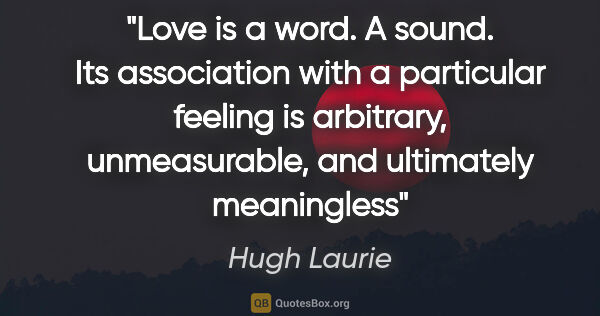Ultimately Quotes (page 14)
This act [creation], as it is for God, must always remain totally inconceivable to man. For we--even our poets and musicians and inventors--never, in the ultimate sense make. We only build. We always have materials to build from. All we can know about the act of creation must be derived from what we can gather about the relation of the creatures to their Creator
C. S. Lewis
Farber says (in my recollection, anyway) the European (or classical) art, including film, is culturally assumed to be a monumental slab. It's about that slab, and how it's been shaped, or what's been carved on it. In "termite art" though, your slab has been wormholed countless times, and its meaning is really taking place in the resulting interstices. The actual art of the piece, in other words, and your enjoyment of it, is taking place in the cracks, and the shape of the slab is coincidental...
William Gibson
Much has been said about Robert, and more will be added. Young men will adopt his gait. Young girls will wear white dresses and mourn his curls. He will be condemned and adored. His excesses damned or romanticized. In the end, truth will be found in his work, the corporeal body of the artist. It will not fall away. Man cannot judge it. For art sings of God, and ultimately belongs to him.
Patti Smith



Humour is, in fact, a prelude to faith; and laughter is the beginning of prayer. Laughter must be heard in the outer courts of religion, and the echoes of it should resound in the sanctuary; but there is no laughter in the holy of holies. There laughter is swallowed up in prayer and humour is fulfilled by faith. The intimate relation between humour and faith is derived from the fact that both deal with the incongruities of our existence. ... Laughter is our reaction to immediate incongruities...
Reinhold Niebuhr
When you're cooking with food as alive as this -- these gorgeous and semigorgeous fruits and leaves and flesh -- you're in no danger of mistaking it for a commodity, or a fuel, or a collection of chemical nutrients. No, in the eye of the cook or the gardener ... this food reveals itself for what it is: no mere thing but a web of relationships among a great many living beings, some of them human, some not, but each of them dependent on each other, and all of them ultimately rooted in soil and...
Michael Pollan
This is why the shaman is the remote ancestor of the poet and artist. Our need to feel part of the world seems to demand that we express ourselves through creative activity. The ultimate wellsprings of this creativity are hidden in the mystery of language. Shamanic ecstasy is an act of surrender that authenticates both the individual self and that which is surrendered to, the mystery of being. Because our maps of reality are determined by our present circumstances, we tend to lose awareness...
Terence McKenna
A plongeur is a slave, and a wasted slave, doing stupid and largely unnecessary work. He is kept at work, ultimately, because of a vague feeling that he would be dangerous if he had leisure. And educated people, who should be on his side, acquiesce in the process, because they know nothing about him and consequently are afraid of him.
George Orwell
America is the promised land, because each generation bequeathed to its children a promise, a promise that they might not come to enjoy but which they fully expected their offspring to fulfill. So the words 'all men are created equal' took a life of its own, ultimately destined to end slavery and enfranchise women. And the words 'equal protection' and 'due process' inevitably led to the end of the words 'separate but equal,' ensuring that the walls of segregation would crumble, whether at the...
Joe Biden
